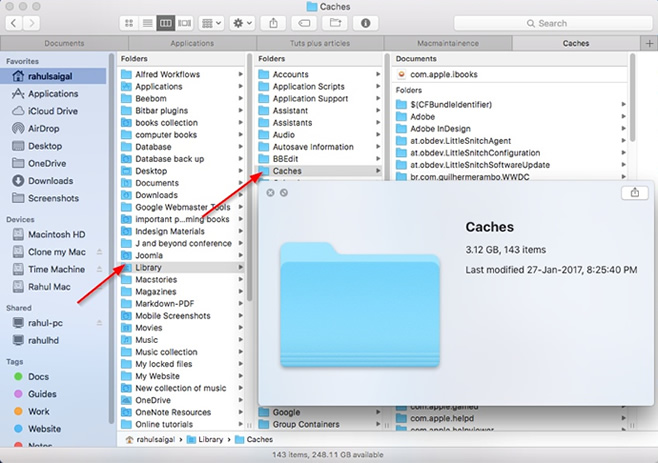Mac Can You Safely Delete Library Caches
Sep 27, 2016 A lot of Mac tutorials mention the Library folder, which is where your macOS applications store things like settings and caches. Some settings can only be changed by editing files in the Library. But the Library is hidden by default. Removing Caches and other Temporary files can save space on your hard drive and in some cases even stop apps behaving erratically or sluggish. The following steps will show you how to safely remove Cache, Log and Temporary files from your system. Removing these files triggers the applications to build a new file when it’s. You can delete app cache on Mac in the same way as user cache, by going to /Library/Caches and removing the insides of the folders with the app name. Proceed with caution! Not all app cache can be safely cleared.
| Click here to return to the 'Delete caches and save disk space' hint |
---
zs
For an Intel equivalent of the disk space usage, try Disk Inventory, also free.
Also, to skip the typing everytime & for a graphical interface, these options are available in both maintenance tools of Onyx and iTweax.
The heavier-duty Onyx actually doesn't indicate the amount used by the Cache, which the light-weight iTweax does.
Mac Can You Safely Delete Library Caches Online
I recently recovered 5 gigs of hard drive space using Tiger Cache Cleaner. My iBook also starts up and runs noticeably faster now.
$ du -k ~/Library/Caches/ sort -n
Great for spotting where that space is going
(you may need to sudo it)
$ sudo -k ~/Library/Caches/ sort -n > du_cache.txt
to get a text file
Doesn't work..
---
Father of Jeremy Logan
---
Father of Jeremy Logan
just use a . (ie. period) in place of pwd.. and no quotes. FYI: in unix the . stands for the current directory and a . stands for the parent directory.
It's easier than that!
du -k sort -n
du defaults to the present directory
(Comparable to TreeSize on Win-Systems)
-- brf
---
--
Adam C.

I'm not sure if this hint has been posted before but if you get info on each application file there are installed language options. I went through all of my apps and deleted all of them except english. Most times this will halve the size of the app. Apple is notorious for installing 12 different languages for each app. I believe there is an apple script that does this automatically too.
Just be careful about deleting some application localizations. Some applications may have dependencies to those localizations. Some time ago, I remember a problem when someone tried to delete localizations, and they ended up having to reinstall that application.
Mac Library Caches
Yep, certain apps can mysteriously misbehave after you've deleted their language localization files. And Apple software updates can reinstall ones you've deleted so it's not necessarily a one-time removal routine.
I don't see any reason to risk removing those files unless reclaiming disk space is a necessity and there are no safer alternatives.
I can recommend Monolingual (monolingual.sourceforge.net), a neat little software that does just that - removes language resources you don't want/need. I've been using it for a couple of years now without problems (making sure never to remove any of the English varieties (my system language).
Anders
Should I Delete Cache Files
Just for reference, I will reiterate what has already been said about the long-term importance (or lack there of) of files in the ~/Library/Caches directory.
Recently I discovered a bug in an application (the producer of said application was 'some kind of fruit company' who shall remain nameless), and the top level tech that I was working with confirmed that its no big deal to delete the contents of the ~/Library/Caches directory.
I'm not advocating that you empty the directory and then lock the folder so that it can never be populated, nor am I advocating that you empty the directory at all. I'm simply stating that you can empty the directory and its not a big deal.
If your Caches folder is out of control, then you should think about some sort of cleaning.
For comparison purposes, here are the current sizes for my (Mac OS X created) Caches folders:
/Library/Caches
24.7 MB
/System/Library/Caches
11.6 MB
/private/var/root/Library/Caches
16 KB
~/Library/Caches
80.2 MB
The oldest directory within the ~/Library/Caches directory was modified Apr 4 2006.
I'd be cautious deleting ~/Library/Caches/Metadata because it contains Spotlight proxy files used by iCal, Safari, and other apps. Something will eventually trigger those files to be regenerated but before that happens Spotlight searching may be temporarily crippled. I discovered that awhile ago with Safari bookmarks and eventually deleted and restored the Bookmarks.plist file to force proxy files to be rebuilt after other methods had failed to do it.
Move itunes library to new computer mac. There are a few ways to transfer your iTunes library from one computer to another: When you get a new Mac, use Setup Assistant (or Migration Assistant, if you’re switching from Windows) to move files—including your iTunes files—from your old computer to the new one. See the Apple Support article Back up and restore your iTunes Library.
First, a true confession: Until very recently (i.e. today) I didn't know about the need to periodically delete the cache and as a result, mine was gigantic.
I deleted the cache by dragging it into the trash and then emptying the trash. Then I told the computer to restart. I understand it takes awhile to rebuild the cache, but I'm not sure what 'awhile' means. It's been almost 2 hours now and I'm wondering if that's normal for the (gulp) years worth of stuff that was stored in my cache. How many hours should I let this continue before taking some other action?
Thanks for your help.